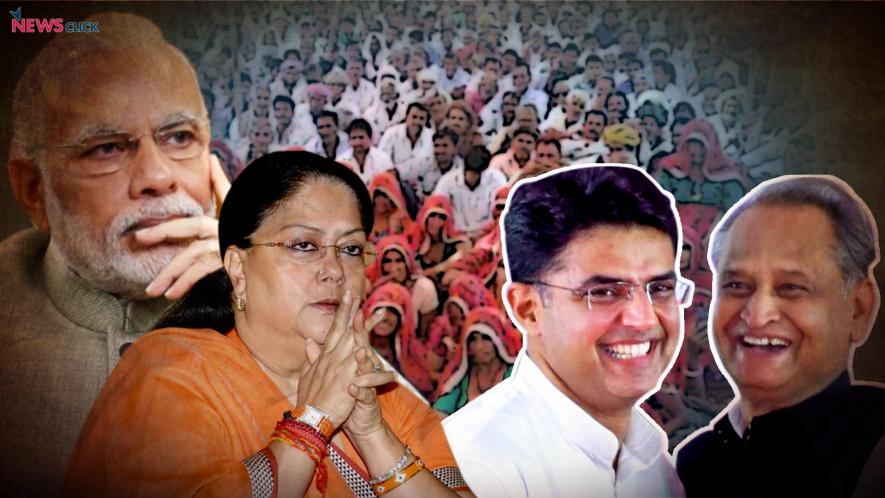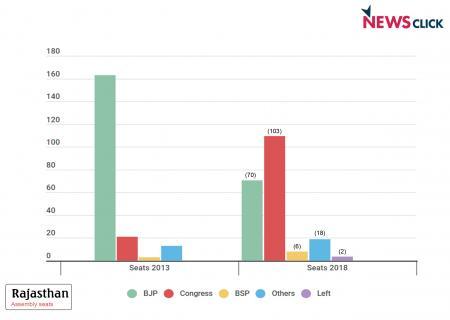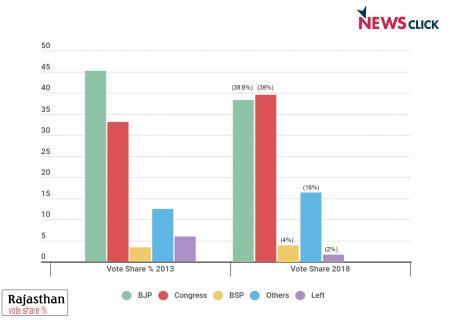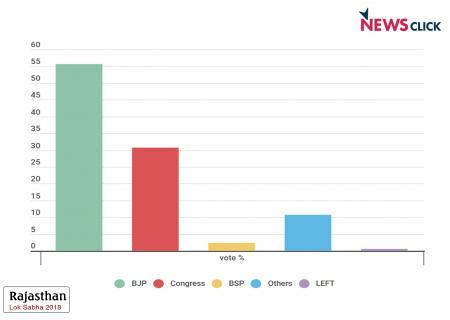Five Reasons Why BJP Lost Rajasthan Assembly Elections

Keeping up with the trend of alternating governments – of Bharatiya Janata Party (BJP) and Congress – for past 20 years, voters in Rajasthan once again preferred Congress over BJP in the assembly elections conducted earlier this month.
The BJP failed in impressing the voters and in surmounting the anger and hostility of the voters towards the incumbent government.
Though CM Vasundhara Raje managed to win the election from Jhalrapatan seat, defeating formidable Manvendra Singh, the BJP has lost – as the trends suggest – the Rajasthan assembly election. Why? We analyse:



Results as per ECI at 5 pm
Farm distress
One of the biggest factors that has influenced the election outcomes in Rajasthan is the farm distress. The biggest problem CM Raje faced in this election was the vicious cycle the farmers of the state have got caught in. It does not help that the state is a desert and a water-starved state. The biggest problem the Raje government faced this time was garlic glut in the market when the crop was harvested in March. It had led to farmers’ suicides in Haroti region – Raje’s stronghold, as she hails from the region. Raje government announced a compensation package, which was not exactly a compensation, but a farm loan waiver that waived farm loan up to Rs 50,000, taken from any ‘sahkari’ (cooperative) bank.
As this reporter travelled through the farming belts of Haroti and Shekhawati regions, the Newsclick team found that this farm loan waiver does not have any reverberation on the ground. The loan taken by the big farmers ranges between Rs 12 lakh and Rs 15 lakh, of which, around Rs 1 lakh might have been taken from the cooperative banks. So, the farmers found that only a maximum of Rs 35,000 could be waived off from their huge debt.
Another problem that they faced was when they were trying to sow fresh crop in November, they could not sell the crop from the previous cycle. Unexpected rains struck them in July that led to production of inferior quality of crops, especially of the Urad pulse. Even the quantity of the yield was less. So, even as the farmers stocked their crops in the market, the market did not pass them. As a result, no MSP was given to them.
So, this had a really bad impact on the farmers. Obviously, at the time of sowing, especially this season, the farmers from the state sow wheat. For this, they need urea. Right before the elections – about three weeks before the polls – farmers discovered that there was no urea in the market.
In the Kota, Bundi and Jhalawar agricultural belt – which is BJP’s stronghold, although Congress too gets a smaller share of seats – loan waiver did not seem to appease the farmers.
In Rajasthan, two out of three farmers enrolled with the Pradhan Mantri Fasal Bima Yojana (PMFBY) are said to have been left out. Of the 53,39,000 farmers of 41 tehsils in 13 districts declared drought-hit in the kharif season in 2017, and part of the Rabi season in 2017-18, all of whom were covered under the PMFBY, only 19,76,000 farmers benefited from the scheme.
Unemployment
According to the Centre for Monitoring Indian Economy, the unemployment figure in the state stood at 13.7 per cent in October, over twice the national figure of 6.6 per cent.
Raje came to power promising 15 lakh jobs. She later replaced the word “job” with “employment” and “employment” with “employment opportunities”. She proudly claimed that instead of 15 lakh jobs, her government had provided 44 lakh jobs. However, Rajasthan government’s minister of labour and employment said in December last year that the total number of jobs provided by her government stood at 2.17 lakh.
A Comptroller and Auditor General (CAG) report exposes her claims on employment. The Rajasthan Skill and Livelihood Development Corporation, the premier agency for skill training, could only achieve 48.90 per cent of its target between 2014 and 2017. Placement data stands at a meagre 35.58 per cent.
An example of the gravity of unemployment in the state can be seen from the fact that for the 18 posts advertised for peons in 2017 by the Rajasthan Assembly, among 13,000 applicants, 129 were engineers, 23 were lawyers, one was a chartered accountant, and 393 were postgraduates.
Under the Mahatma Gandhi National Rural Employment Guarantee Act (MNREGA), the number of days of employment stands at 50 instead of 150.
BJP’s infighting
Chief Minister Vasundhra Raje and Bharatiya Janata Party President Amit Shah did not appear to be on the same page. There was apparently a rift between them over the selection of candidates. Therefore, the saffron party could not change a number of candidates as its central leadership would have wanted.
Shah reportedly wanted to change at least 100 sitting MLAs given the huge anti-incumbency against them, but Raje allowed only 45 changes. Her argument was that the party cannot ignore its “committed” workers who have given time to the organisation.
Raje’s inaccessibility
The common complaint against the CM was that she was the most “inaccessible”, “insensitive” and “non-performing” chief minister who was allegedly least bothered about what is happing in the state. She was even inaccessible to her Cabinet collegues.
Raje’s government was accused of being involved in corruption. During 2003-08, when she was the chief minister, over 600 mining leases were allotted allegedly without following due procedure. It had resulted in the Rajya Sabha being adjourned many times, and had brought shame to the state.
Cow vigilantism and hate crimes
Rajasthan has been in news for cow vigilantism. The state – according to data with the state police – witnessed at least 23 incidents of cow-related violence in 2017.
The data indicates that from January till the end of November, 23 cases of cow-related violence were lodged at police stations in various districts of the state.
The data shows that of the 23 cases of cow-related violence, five cases took place in Alwar and Sri Ganganagar each.
The data also shows that out of the 23 cases, the police have filed chargesheet in only 12 instances with no case made out in five incidents, and the investigation still pending in six cases.
In April, 55-year-old Haryana dairy farmer Pehlu Khan was allegedly lynched in Alwar district while he was transporting bovines purchased from a cattle market in Jaipur. In November, Umar, was shot dead while ferrying cows. His body was allegedly dumped on railway tracks by the assailants.
According to the data, which also includes cases of violence perpetrated by cow smugglers, Tonk and Chittorgarh districts have also witnessed three such instances each.
There was a visible anger against the ruling dispensation among minorities, particularly Muslims, and farming community, which suffers the most as stray cattle cause havoc in the villages, especially on the farmlands.
Other hits and misses
The Rajasthan government’s decision to merge schools with a low student count with larger schools within the vicinity (of 3-4 km) has allegedly led to the closure of 17,000 schools, and is said to have affected over 5 lakh children.
Raje’s decision to extend the tenure of the Lokayukta to eight years from the earlier five also did not go down well. People say it caused a severe dent to the integrity of the institution.
Get the latest reports & analysis with people's perspective on Protests, movements & deep analytical videos, discussions of the current affairs in your Telegram app. Subscribe to NewsClick's Telegram channel & get Real-Time updates on stories, as they get published on our website.
























